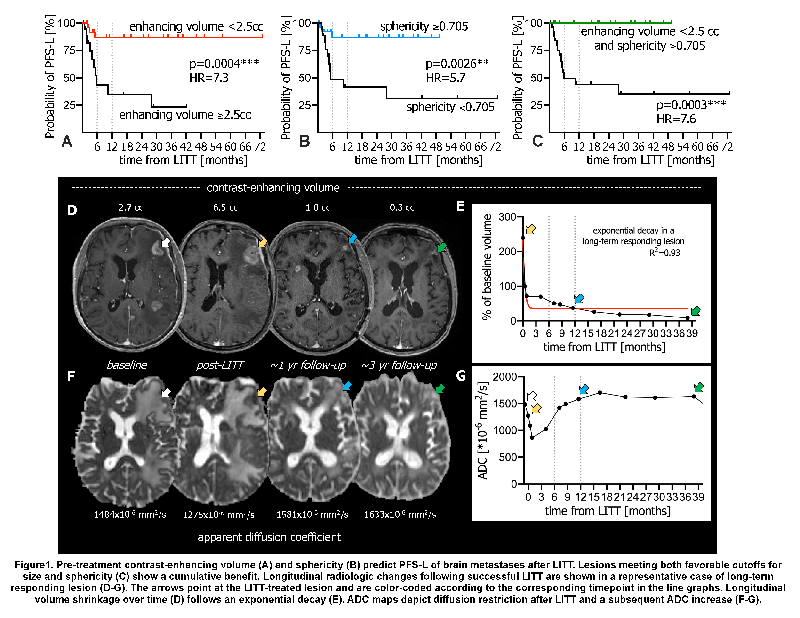Research on Treatment of Brain Metastases Wins 2023 Chynn Award
Radiographic features help identify patients who can benefit from laser interstitial thermal treatment

A study on radiographic assessment of brain metastases treated with laser interstitial thermal treatment (LITT) has won the 2023 Kuo York Chynn Neuroradiology Research Award for the top neuroradiology research paper presented during the RSNA annual meeting.
For patients with brain metastases the outlook is poor, with survival measured in months rather than years. Established treatments like surgery and stereotactic radiation therapy can help extend survival, but often the metastases grow back and are resistant to treatments that have already been used.
LITT is a promising option for patients with brain metastases who have previously undergone surgery or radiation therapy. Treatment is applied via a laser fiber that’s threaded toward the tumor site. Once the fiber is in place, heat is used to damage tumor tissue under MRI guidance.
“This treatment is still kind of novel and there are not a lot of centers that do it,” said study author Francesco Sanvito, MD, a project scientist at the University of California in Los Angeles’ Brain Tumor Imaging Laboratory. “There are no definitive ways to say which patients are good candidates.”

Size and Shape of Lesion Can Predict a Response
Dr. Sanvito and colleagues retrospectively studied 47 brain metastases treated with LITT. Of the 47 metastases, 13 progressed after LITT, 17 responded and 17 were stable.
Comparing metastases that did and did not progress after treatment showed that neither clinical variables nor lesion location had much of an impact on response. Instead, the key factors predicting response were the size and shape of the lesion. Lesions smaller than 2.5 cubic centimeters and more spherical lesions were linked with longer progression-free survival.
“The take-home message is that you can stratify patients before treatment. If the lesion is small and spherical enough, they’re going to be good candidates,” Dr. Sanvito said.
In the second part of the study, Dr. Sanvito evaluated the use of MRI after LITT to predict if the metastases would shrink or grow back. The researchers fitted longitudinal post-LITT volume shrinkage in responding lesions to an exponential decay model and compared changes in the apparent diffusion coefficient (ADC) between scans done before treatment, soon after treatment, and at one year and two or more years of follow-up.
For 15 out of 17 brain metastases that met the criteria for response, preliminary analyses showed an overall significant ADC decrease immediately after the treatment and a tendency towards a subsequent progressive ADC increase at one year and at two years.Preliminary analyses showed an overall significant ADC decrease immediately after the treatment and a tendency towards a subsequent progressive ADC increase at one year and at two years.
“LITT is still a new treatment, so there’s not a lot of research characterizing what happens when you treat these tumors and how to monitor them correctly,” Dr. Sanvito said. “I believe more and more centers are going to be starting up this treatment, so it’s important that we’ve started collecting evidence on how to do optimal clinical management and radiographic monitoring of these lesions.”
The research is ongoing, and Dr. Sanvito hopes to conduct prospective studies in the future.
Funded with a donation by internationally renowned neuroradiologist and longtime RSNA member Kuo York Chynn, MD, the RSNA Kuo York Chynn Neuroradiology Research Award provides $3,000 to the author of the top neuroradiology research paper presented at the RSNA annual meeting.
“It’s very gratifying to know that your peers appreciate the work that you’re doing and the efforts you put in to contribute to the field,” Dr. Sanvito said.
For More Information
Access the RSNA 2023 session, “Baseline and Longitudinal Radiologic Assessment of Brain Metastases Treated With Laser Interstitial Thermal Therapy (LITT),” at Meeting.RSNA.org.
Read RSNA News stories on previous Chynn Award recipients: